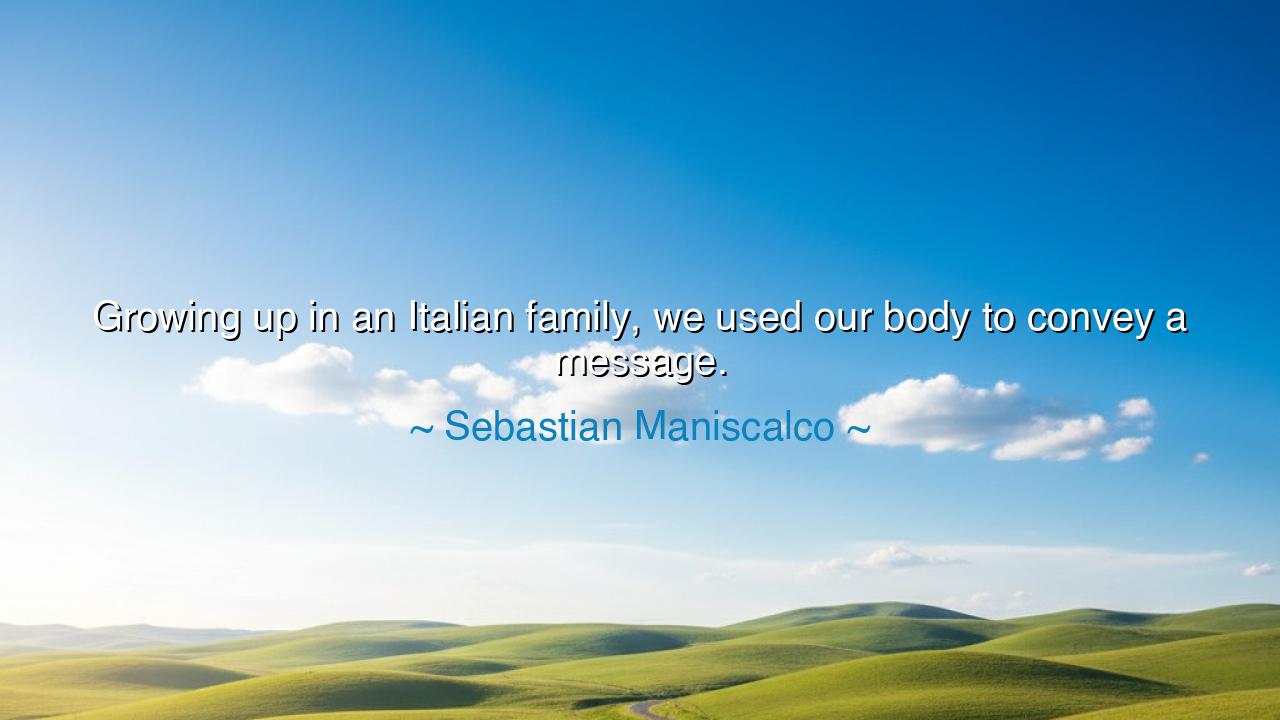
Growing up in an Italian family, we used our body to convey a






Host: The room felt warm, the evening air settling as the soft light from the lamp illuminated the space. Jack sat at the table, his fingers lightly tracing the edge of a notebook, deep in thought. Jeeny stood near the window, her arms loosely crossed, her gaze fixed on the darkening world outside. The words of Sebastian Maniscalco hung between them, inviting a reflection on culture, expression, and the unique ways we communicate.
Jeeny: “I’ve been thinking about Sebastian Maniscalco’s words: ‘Growing up in an Italian family, we used our body to convey a message.’ It’s such an interesting way of talking about communication, isn’t it? The idea that gestures and physical expression were as important, if not more so, than words in his family. It makes me think about how different cultures have their own ways of expressing emotions and messages, beyond just speaking.”
Jack: “Yes, it’s fascinating. Maniscalco is showing us that in an Italian family, the body isn’t just a vehicle for movement—it’s a key part of the language itself. Gestures, facial expressions, body language—they all play a role in conveying meaning. In a way, it’s like they were saying more with their bodies than with their words. It’s a form of communication that goes beyond language, one that relies on intensity, emotion, and connection.”
Jeeny: “Exactly. It’s about expression, but in a physical sense. Italians are known for being very expressive, and it’s not just about what they say—it’s how they say it, how they physically convey their emotions. You can understand so much from a look, a gesture, or the way someone moves their hands or face. It’s like they have a whole vocabulary of expression built into their bodies.”
Host: The stillness in the room deepened as Jack paused, his thoughts drifting to the layers of communication that go beyond spoken language. Jeeny turned toward him, her expression softening as they both reflected on the importance of physicality in communication.
Jack: “It makes me think about how we all communicate in different ways. Some cultures, like Maniscalco’s, place a heavy emphasis on physical gestures and expressions. Others might be more reserved, relying on words and tone. But what Maniscalco is pointing out is that there’s a kind of universality in these physical cues. Whether you’re Italian or not, people understand emotion through the body. It’s a language we all speak, regardless of the words.”
Jeeny: “Yes, and there’s something universal about it. You don’t need to understand the language to understand the message. Maniscalco grew up in a family where the body was as much a tool for communication as the voice. And I think that’s something a lot of people experience in their own cultures—how much can be said without saying anything at all. The energy and emotion we put into our gestures, our movements, are often just as powerful as the words themselves.”
Jack: “And maybe that’s why humor, especially physical comedy, is so universally understood. It doesn’t rely on words—it relies on expression. A slapstick moment or a well-timed gesture can communicate emotion, intention, and meaning without a single word. It’s like the body has its own language, one that transcends cultures and connects people in a way that words sometimes can’t.”
Jeeny: “Exactly. And I think Maniscalco is also pointing out that growing up in an Italian family meant understanding that communication was a full-body experience. It wasn’t just about speaking—it was about living in the moment, fully engaged with the people around you. It’s an invitation to experience life with intensity, with emotion, and with the willingness to express that physically.”
Host: The room had grown quieter, the weight of their conversation sinking into a deeper reflection on how we communicate. Maniscalco's words had illuminated the importance of non-verbal communication, how culture, gesture, and physical expression shape the way we relate to each other. Jack sat back slightly, his fingers resting gently on the table, while Jeeny’s gaze moved from the window to him, both of them understanding that sometimes, the most powerful messages are the ones we convey without saying a word.
Jack: “It’s amazing to think about how much we communicate without even realizing it. Maniscalco grew up in a world where the body spoke just as loudly as the voice. And maybe that’s a lesson for all of us—about how much we can say with our presence, with the way we move, with the way we express ourselves.”
Jeeny: “Yes, and it’s about embracing the fullness of communication. It’s not just the words we choose—it’s the energy, the gestures, the feeling we put into the conversation. Sometimes the most important message is the one we say without speaking at all.”
Host: The evening had fully settled in, and the conversation left behind a quiet realization—that communication is more than just words. It’s the energy we put into our interactions, the gestures we make, the way we physically connect with the world around us. Maniscalco’s words had reminded them both of the power of expression—how we convey meaning with our entire being, not just our voices.






AAdministratorAdministrator
Welcome, honored guests. Please leave a comment, we will respond soon